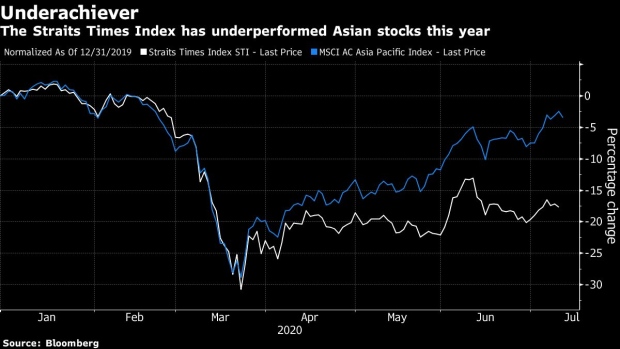Jul 12, 2020
Singapore Stocks Seen Helped by Election as Diversity Increases
, Bloomberg News

(Bloomberg) -- Another mandate for Singapore’s ruling party -- along with the opposition winning its most seats ever -- will boost the city-state’s equities, according to analysts.
Prime Minister Lee Hsien Loong’s People’s Action Party retained a firm grip on power but suffered its weakest performance in 55 years in office in an election on Friday as the opposition Workers’ Party won a record 10 seats and secured two group constituencies. A more diverse parliament could lead to better policy reforms that will help the city-state’s companies, the commentators say.
“A diverse set of voices in the parliament mitigates any potential of group think,” said Justin Tang, head of Asian research at United First Partners. “Open and tough discussions will foster even better policies that will ultimately flow down to firms including government-linked companies.”
The Straits Times Index has already been rebounding, rising 19% from a low in March as government stimulus and a reopening of the economy eased investors’ concerns about the impact of the coronavirus on the economy. But even after its recovery, the benchmark stock gauge is still down 18% this year.
Here are some comments from analysts on Singapore’s election:
Buy Any Dip
“Any dip in markets due to the lower vote share of the PAP should be bought into as Singaporeans have voted for continuity as well as positive change,” said Nirgunan Tiruchelvam, head of consumer equity research at Tellimer. “The market has already seen the worst due to Covid-19 and the U.S.-China trade war.”
“Singapore companies engaged in manufacturing will do better as the government is likely to pursue more reforms” focusing on the sector, Tiruchelvam said.
Government-Linked Companies
Watch government-linked companies such as Singapore Press Holdings Ltd., the Sembcorp group, Singapore Airlines group and SATS Ltd., said Tang of UFP.
They are likely to become more nimble, and to adopt new solutions and new management styles as the diversity of voices in parliament leads to change at the government-linked company level, he said.
Gradual Policy Changes
Joel Ng, an analyst at KGI Securities (Singapore) Pte said that “any policy shifts will be gradual, as was the case after 2011’s general elections.”
©2020 Bloomberg L.P.